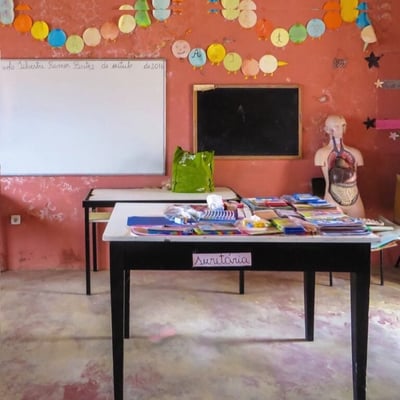1
00:00:03,196 –> 00:00:05,736
Mãe: Miguel, já arrumaste o teu quarto?
{{Mother: Miguel, have you tidied up your room yet?}}
2
00:00:05,736 –> 00:00:07,556
Miguel: Não, mãe.
{{Miguel: No, Mom.}}
3
00:00:07,556 –> 00:00:09,515
Ainda estou a brincar.
{{I’m still playing.}}
4
00:00:09,516 –> 00:00:11,636
Mãe: Faz o que eu te digo!
{{Mother: Do what I tell you!}}
5
00:00:11,716 –> 00:00:15,576
Miguel: Ó mãe, mas eu quero brincar mais um bocadinho!
{{Miguel: Oh Mom, but I want to play a little more!}}
6
00:00:15,585 –> 00:00:18,665
O Diogo não teve de arrumar nada…
{{Diogo didn’t have to clean up anything…}}
7
00:00:18,665 –> 00:00:22,196
Mãe: Miguel, não te digo outra vez!
{{Mother: Miguel, I won’t tell you again!}}
8
00:00:22,196 –> 00:00:25,676
Despacha-te, que os teus avós estão a chegar!
{{Hurry up, your grandparents are coming!}}
9
00:00:25,676 –> 00:00:28,836
O teu irmão foi com o teu pai jogar futebol
{{Your brother went with your father to play football}}
10
00:00:28,836 –> 00:00:31,416
e não está aqui para ajudar.
{{and he’s not here to help.}}
11
00:00:31,426 –> 00:00:33,055
Miguel: Ó mãe…
{{Miguel: Oh Mom…}}
12
00:00:33,056 –> 00:00:38,336
Mãe: Filho, tens de perceber que há um tempo para tudo.
{{Mother: Son, you have to understand that there is a time for everything.}}
13
00:00:38,336 –> 00:00:40,396
Já estiveste a brincar.
{{You’ve been playing.}}
14
00:00:40,396 –> 00:00:42,976
Agora arruma o teu quarto
{{Now clean up your room}}
15
00:00:42,976 –> 00:00:46,596
e ajuda-me porque os teus avós estão quase a chegar,
{{and help me because your grandparents are about to arrive,}}
16
00:00:46,596 –> 00:00:49,496
e nós estamos atrasados.
{{and we are late.}}
17
00:00:49,496 –> 00:00:54,616
Depois de almoço, vais ter mais tempo para brincar com o teu avô.
{{After lunch, you’ll have more time to play with your grandfather.}}
18
00:00:54,616 –> 00:00:56,276
Miguel: A sério?
{{Miguel: Really?}}
19
00:00:56,276 –> 00:00:57,896
Posso brincar com o avô?
{{I can play with Grandpa?}}
20
00:00:57,896 –> 00:01:00,016
Mãe: Claro que sim!
{{Mother: Of course!}}
21
00:01:00,016 –> 00:01:03,076
Eu e a tua avó vamos às compras,
{{Your grandmother and I are going shopping,}}
22
00:01:03,076 –> 00:01:07,596
portanto tu podes ficar a brincar com o teu avô.
{{so you can stay and play with your grandfather.}}
23
00:01:07,596 –> 00:01:10,296
Podes mostrar-lhe aquele jogo novo.
{{You can show him that new game.}}
24
00:01:10,306 –> 00:01:11,306
Miguel: Qual?
{{Miguel: Which one?}}
25
00:01:11,306 –> 00:01:15,976
Mãe: Aquele jogo das perguntas com os queijinhos.
{{Mom: That game of questions with the little cheeses.}}
26
00:01:15,976 –> 00:01:19,076
Miguel: Achas que o avô vai gostar?
{{Miguel: Do you think Grandpa will like it?}}
27
00:01:19,076 –> 00:01:21,166
Mãe: Ele vai adorar!
{{Mother: He’ll love it!}}
28
00:01:21,166 –> 00:01:22,596
Miguel: Ok.
{{Miguel: Okay.}}
29
00:01:22,596 –> 00:01:24,616
Deixa-me procurar o jogo…
{{Let me find the game…}}
30
00:01:24,616 –> 00:01:27,136
Mãe: Está aqui dentro do armário.
{{Mom: It’s right here in the closet.}}
31
00:01:27,136 –> 00:01:30,096
Vou deixá-lo em cima da mesa da sala.
{{I’ll leave it on the living room table.}}
32
00:01:30,096 –> 00:01:32,816
Agora arruma o quarto
{{Now clean your room}}
33
00:01:32,816 –> 00:01:35,516
e depois vem ajudar-me a pôr a mesa.
{{and then come help me set the table.}}
34
00:01:35,516 –> 00:01:36,536
Pode ser?
{{Okay? (Literal: Can it be?)}}
35
00:01:36,536 –> 00:01:37,546
Miguel: Combinado!
{{Miguel: Deal!}}
 We respect your privacy and have a ZERO TOLERANCE for spam.
We respect your privacy and have a ZERO TOLERANCE for spam.
















Good piece. The imperative is not difficult, but I don’t get much practice.
why is it deixá-lo – I don’t understand the lo as deixá does not end in s, t or z….
Sorted now – I see it is the infinitive deixar (after vou) with the r taken off and the accent added to the a. Was not paying close enough attention!
Nailed it, Janet! 🙂
O teu irmão foi com o teu pai jogar futebol
e não está aqui (para) ajudar.
In this sentence why is ‘para’ used before ‘ajudar’ but not before ‘jogar’? Would it be acceptable to use ’para’ in front of both verbs?
Olá, Whit. In the first case, we have a compound verbal structure, “foi jogar”, where the verb ir (foi) is the auxiliary verb and jogar is the main one. So, between them, no preposition is required (but optional elements like “com o teu pai” can be inserted). In the second case, we don’t have a compound tense, but two separate verbs that need the preposition as a connecting element between them 🙂
I often have problems emphasizing the words correctly, special verbs …here I am a bit confused, because in the vocabulary list “ajuda-me” it is emphasized differently than in the spoken text. What is correct?
To emphasize “ju” or “da”
Olá 🙂 The stress lies on the syllable “ju”: aJUda-me. Both examples sound correct to my ears, but the word is pronounced more clearly in the vocabulary list, which might be what’s making it sound different for you.
At first, I thought that “aquele jogo das perguntas com os queijinhos” was some kind of traditional Portuguese game. Then I realised… 😀
”Ja estiveste a brincar.”
Why does it have to be ‘estiveste’, not ‘estavas’? What is the difference between the two kinds of past progressive: estiveste a + V and estavas a + V
The difference between “estiveste a” and “estavas a” is a matter of past tense usage in Portuguese. “Estiveste a” is the preterite tense, indicating a completed action in the past, while “estavas a” is the imperfect tense, used for ongoing past actions. 🙂